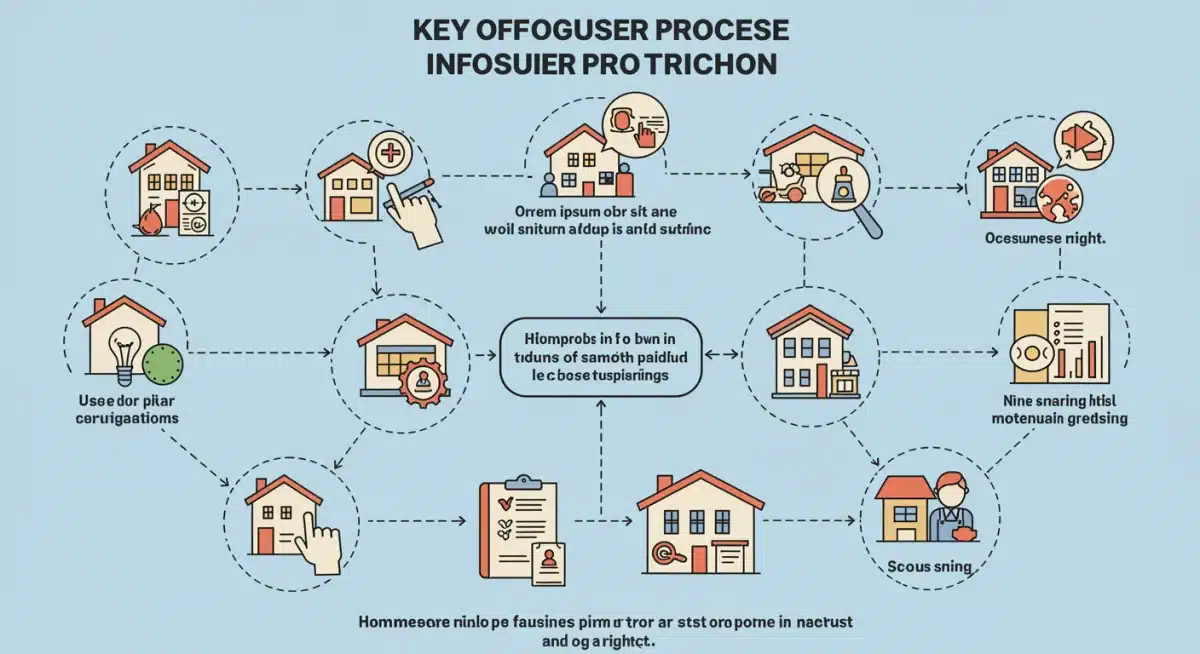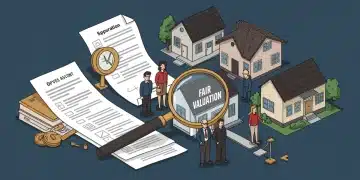Foreclosure Protections 2025: Key Consumer Rights for Homeowners

Navigating Foreclosure Protections: Key Consumer Rights for Distressed Homeowners in 2025 is crucial for homeowners facing financial hardship, providing vital legal frameworks and resources to prevent property loss.
As 2025 unfolds, Navigating Foreclosure Protections: Key Consumer Rights for Distressed Homeowners in 2025 remains a critical topic for many American families. New regulations and evolving economic conditions necessitate a clear understanding of the safeguards available. This article will break down the essential rights and emerging protections designed to assist homeowners in distress, offering timely, factual information to help you stay informed and prepared.
Understanding the evolving landscape of foreclosure protections in 2025
The landscape of foreclosure protections in 2025 is continually shifting, influenced by economic trends and legislative updates. Homeowners must grasp these changes to effectively assert their rights and explore all available options. The federal government, along with state agencies, continues to refine policies aimed at preventing avoidable foreclosures, especially for those impacted by unforeseen financial challenges. These protections are not static; they are dynamic responses to the ongoing needs of the housing market and consumer vulnerability.
It is important to recognize that while some protections are nationwide, others vary significantly by state. This necessitates a localized understanding of the laws governing mortgage lending and foreclosure proceedings. The objective is always to provide homeowners with a fair chance to resolve their mortgage delinquencies before losing their homes. Financial institutions are also under increasing scrutiny to comply with these consumer-centric regulations, ensuring that all homeowners receive due process and access to appropriate assistance programs. This year’s focus includes enhanced transparency and clearer communication from lenders.
Key federal and state initiatives
- Federal Housing Administration (FHA) policies: The FHA often leads with initiatives that provide mortgage relief options, such as loan modifications, forbearance agreements, and partial claims. These programs are continuously updated to address current economic realities.
- State-specific homeowner assistance funds (HAF): Many states continue to operate HAF programs, funded by the American Rescue Plan Act, offering financial aid for mortgage payments, utility costs, and other housing-related expenses. Eligibility criteria and available funds vary by state.
- Consumer Financial Protection Bureau (CFPB) oversight: The CFPB plays a crucial role in regulating mortgage servicers, ensuring they adhere to fair debt collection practices and provide accurate information regarding loss mitigation options.
Understanding these initiatives is the first step in Navigating Foreclosure Protections: Key Consumer Rights for Distressed Homeowners in 2025. Homeowners should proactively seek information from official sources and consider engaging with housing counselors to understand how these programs apply to their specific situations. The goal is to empower homeowners with knowledge, enabling them to make informed decisions when facing potential foreclosure.
Your fundamental rights as a distressed homeowner
Distressed homeowners possess fundamental rights designed to protect them throughout the foreclosure process. These rights are enshrined in federal and state laws, ensuring fair treatment and opportunities to resolve financial difficulties. Knowing these rights is paramount, as it allows homeowners to challenge improper procedures and negotiate effectively with their lenders. Ignoring these protections can lead to missed opportunities for relief and potentially expedited foreclosure.
One primary right is the right to receive adequate notice. Lenders are typically required to provide specific notices before initiating foreclosure proceedings, detailing the delinquency, the amount owed, and the homeowner’s options to cure the default. These notices are not merely formalities; they are critical communications that trigger important timelines and opportunities for intervention. Additionally, homeowners have the right to appeal decisions made by their mortgage servicers regarding loan modification applications or other loss mitigation requests. This appeals process ensures that decisions are reviewed fairly and any errors can be corrected.
Critical homeowner protections
- Right to receive pre-foreclosure notices: Before a foreclosure can begin, servicers must send specific notices, including a breach letter and a notice of intent to foreclose, outlining the default and options available.
- Right to apply for loss mitigation: Homeowners have the right to apply for loan modifications, forbearance, or other alternatives to foreclosure. Servicers must review these applications fairly and not initiate foreclosure while an application is under review.
- Right to a single point of contact: Many regulations require mortgage servicers to assign a single point of contact to assist distressed borrowers, ensuring consistent communication and guidance throughout the process.
These rights are critical components of Navigating Foreclosure Protections: Key Consumer Rights for Distressed Homeowners in 2025. Homeowners should meticulously document all communications with their servicers, keep copies of all submitted documents, and note dates and times of conversations. This meticulous record-keeping can be invaluable if disputes arise or if legal action becomes necessary. Understanding and exercising these rights can significantly alter the outcome for many struggling homeowners.
Navigating loss mitigation options and assistance programs
Loss mitigation options are vital tools for homeowners seeking to avoid foreclosure. These programs are designed to help borrowers facing financial hardship manage their mortgage payments and retain their homes. The array of options can seem daunting, but each serves a specific purpose, from temporarily reducing payments to permanently altering loan terms. Successfully navigating these options requires a clear understanding of eligibility criteria and the application process, which can often be complex and time-sensitive.
Mortgage servicers are generally required to provide information about loss mitigation options once a homeowner becomes delinquent. These options include, but are not limited to, loan modifications, which alter the original terms of the loan; forbearance agreements, which temporarily suspend or reduce payments; and repayment plans, which allow homeowners to catch up on missed payments over a set period. Each option has its advantages and disadvantages, depending on the homeowner’s specific financial situation and the nature of their hardship. The key is to engage with the servicer early and consistently.

Common loss mitigation strategies
- Loan modification: This involves permanently changing one or more of the terms of a mortgage loan, such as the interest rate, loan term, or principal balance, to make payments more affordable.
- Forbearance: A temporary postponement or reduction of mortgage payments, often granted during periods of financial distress, with the understanding that the missed payments will be repaid later.
- Repayment plan: An agreement to pay the past-due amount of a mortgage over a specified period, typically by adding a portion of the missed payments to current mortgage payments.
- Short sale: Selling the home for less than the amount owed on the mortgage, with the lender agreeing to accept the sale proceeds as full satisfaction of the debt.
For homeowners, proactively exploring these options is critical for Navigating Foreclosure Protections: Key Consumer Rights for Distressed Homeowners in 2025. It is advisable to gather all necessary financial documents before contacting the servicer to streamline the application process. Housing counselors approved by the Department of Housing and Urban Development (HUD) can offer free guidance and help homeowners understand which options are best suited for their circumstances, acting as an impartial third party in negotiations with lenders.
The role of housing counselors and legal aid
When facing the threat of foreclosure, the support of housing counselors and legal aid services can be invaluable. These professionals offer expert guidance, helping homeowners understand their rights, navigate complex paperwork, and communicate effectively with mortgage servicers. Their involvement can significantly improve a homeowner’s chances of securing a favorable outcome and avoiding property loss. Many of these services are available at no cost, making them accessible to those who need them most.
HUD-approved housing counselors are trained to provide comprehensive advice on mortgage delinquency, default, and foreclosure prevention. They can help homeowners assess their financial situation, explain loss mitigation options, and assist with preparing and submitting applications. Their expertise extends to interpreting intricate regulations and ensuring that servicers adhere to their legal obligations. For more complex cases or when legal disputes arise, legal aid attorneys specialize in consumer law and can represent homeowners in court or during negotiations, protecting their interests against potentially aggressive lending practices.
Benefits of professional assistance
- Expert guidance: Counselors and attorneys possess in-depth knowledge of foreclosure laws and assistance programs, offering tailored advice for individual situations.
- Advocacy: They can act as advocates on behalf of homeowners, ensuring that lenders and servicers comply with regulations and treat borrowers fairly.
- Paperwork assistance: Navigating the extensive documentation required for loss mitigation can be overwhelming; professionals can help organize and submit necessary forms accurately and on time.
Engaging with these resources is a smart strategy for Navigating Foreclosure Protections: Key Consumer Rights for Distressed Homeowners in 2025. Homeowners should not hesitate to seek help early in the process, as timely intervention can prevent the situation from escalating. These professionals provide a crucial layer of support, ensuring that distressed homeowners are not left to face the complexities of the foreclosure system alone. They are a cornerstone of consumer protection in the housing sector.
Avoiding foreclosure scams and predatory practices
Unfortunately, the distress associated with potential foreclosure can make homeowners vulnerable to scams and predatory practices. Unscrupulous individuals and companies often target struggling homeowners with false promises of quick fixes or guaranteed solutions, frequently charging exorbitant fees for services that yield no benefit. Recognizing and avoiding these scams is a critical aspect of Navigating Foreclosure Protections: Key Consumer Rights for Distressed Homeowners in 2025.
Common scams include requests for upfront fees for loan modifications, promises to stop foreclosure proceedings in exchange for transferring property titles, or demands for personal financial information over unsolicited calls or emails. Legitimate housing counselors and legal aid services typically do not charge upfront fees for their advice and always operate with transparency. Homeowners should be highly skeptical of any offer that sounds too good to be true, or that pressures them into making immediate decisions without proper review. Always verify the credentials of any professional offering assistance.

Warning signs of foreclosure scams
- Upfront fees: Legitimate housing counselors and attorneys rarely charge fees before providing services, especially for initial consultations.
- Guaranteed outcomes: No one can guarantee that you will avoid foreclosure, as outcomes depend on many factors. Be wary of anyone promising a sure solution.
- Instructions to avoid contact with your lender: Scammers often tell homeowners to stop communicating with their mortgage servicer, which can worsen the situation.
- Requests to sign over your deed: Never sign over your property deed or title to a third party, as this is a common tactic in equity stripping scams.
Protecting yourself from these fraudulent schemes is as important as understanding your rights. Homeowners should always work with HUD-approved housing counselors or reputable legal aid organizations. If you suspect a scam, report it to the Consumer Financial Protection Bureau (CFPB), your state’s Attorney General’s office, or the Federal Trade Commission (FTC). Vigilance and informed decision-making are essential safeguards against falling victim to predatory practices while seeking to address mortgage challenges.
Preparing for 2025: proactive steps for homeowners
Proactive preparation is key for homeowners to effectively manage their financial health and protect against potential foreclosure in 2025. Rather than waiting for financial distress to set in, taking steps now can significantly strengthen a homeowner’s position and provide a buffer against unforeseen circumstances. This forward-thinking approach is fundamental to Navigating Foreclosure Protections: Key Consumer Rights for Distressed Homeowners in 2025, ensuring readiness for any economic shifts.
Start by regularly reviewing your mortgage statements and understanding all terms and conditions of your loan. Create and maintain an emergency fund that can cover several months of mortgage payments and essential living expenses. This financial cushion can be invaluable during periods of unemployment, illness, or other income disruptions. Additionally, consider consulting with a financial planner to develop a comprehensive budget and long-term financial strategy that includes housing stability. Staying informed about economic forecasts and housing market trends can also provide early warnings of potential challenges.
Essential proactive measures
- Build an emergency fund: Aim for at least three to six months of living expenses, including mortgage payments, to provide financial stability during unexpected events.
- Review mortgage terms annually: Understand your interest rate, payment schedule, and any clauses that might affect your payments or options in the future.
- Monitor credit health: A strong credit score can offer more options for refinancing or other financial solutions if needed. Regularly check your credit report for errors.
- Stay informed about housing policies: Keep up-to-date with federal and state legislative changes regarding mortgage and foreclosure protections, as these can directly impact your rights.
These proactive steps are not just about avoiding foreclosure; they are about building overall financial resilience. By taking control of their financial future, homeowners can face 2025 with greater confidence, knowing they have prepared for various scenarios. This preparation ensures that should challenges arise, they are equipped with the knowledge and resources necessary for Navigating Foreclosure Protections: Key Consumer Rights for Distressed Homeowners in 2025 effectively.
| Key Protection Area | Brief Description |
|---|---|
| Right to Notice | Lenders must provide specific pre-foreclosure notices detailing delinquency and options. |
| Loss Mitigation | Homeowners can apply for loan modifications, forbearance, or repayment plans. |
| Professional Aid | HUD counselors and legal aid offer free expert guidance and advocacy. |
| Scam Prevention | Vigilance against upfront fees and guaranteed outcomes is crucial to avoid fraud. |
Frequently asked questions about foreclosure protections
In 2025, significant changes focus on enhanced transparency from mortgage servicers and expanded access to state-specific homeowner assistance funds. Federal agencies are also emphasizing early intervention programs to prevent defaults before they escalate, providing more structured pathways for distressed homeowners to seek help.
Eligibility for a loan modification typically depends on your financial hardship, income, and property value. Your mortgage servicer will assess your ability to make modified payments. Contacting a HUD-approved housing counselor can help you understand specific criteria and prepare your application effectively.
If your loss mitigation application is denied, you generally have the right to appeal the decision. Your servicer must provide clear reasons for the denial and instructions on how to appeal. Seek assistance from a housing counselor or legal aid attorney to help prepare and submit a strong appeal.
While specific new programs are always evolving, federal efforts in 2025 continue to support existing frameworks like FHA loan modifications and CFPB regulations. Homeowner Assistance Funds (HAF) programs, though state-administered, are federally supported and remain a key resource. Always check official government websites for the latest updates.
To protect yourself from scams, never pay upfront fees for foreclosure assistance and avoid anyone guaranteeing a specific outcome. Always verify credentials of advisors, preferably using HUD-approved counselors. Be wary of unsolicited offers and report suspicious activities to consumer protection agencies to safeguard your assets.
Looking Ahead: The Future of Homeowner Protection
The landscape of homeowner protection in the United States is entering a new and more accountable era, shaped by evolving legislation, increased transparency, and growing advocacy for borrower rights. As 2025 progresses, the focus will increasingly center on ensuring that foreclosure prevention measures are not just reactive, but preventative—empowering homeowners to identify risks early and access fair resolutions before financial strain becomes irreversible.
New legislative frameworks are already setting this transformation in motion. Recent reforms, such as those highlighted in KRDO’s report on the new HOA transparency law, reflect a broader nationwide trend toward stronger consumer safeguards and institutional accountability. These initiatives aim to make the relationship between homeowners, lenders, and associations more transparent and equitable—ensuring that critical decisions affecting property ownership are communicated clearly and ethically.
Looking forward, policymakers, housing advocates, and financial institutions will need to collaborate to sustain this momentum. The next phase of homeowner protection will likely include expanded financial education programs, accessible mediation processes, and standardized digital communication systems between borrowers and lenders. Technology, too, will play a crucial role—leveraging AI and data analytics to identify early signs of financial distress and trigger timely interventions.
For homeowners, the path ahead demands engagement, vigilance, and proactive participation. Staying informed about local and federal protections, reviewing HOA governance updates, and maintaining transparent communication with lenders will be key strategies for resilience. The long-term vision is clear: a housing ecosystem where foreclosure truly becomes a last resort, and where every homeowner has the tools and knowledge to protect their property, preserve their equity, and remain securely rooted in their community.





